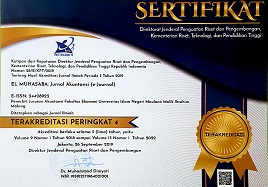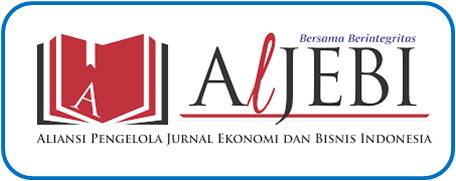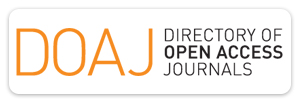Revealing Islamic Cultural Values behind Capital Accounting Practices: A Study of Islamic Ethnomethodology
Abstract
Method: This study uses an Islamic paradigm with an Islamic ethnomethodology approach.
Results: The results showed that the source of capital from the coachmen to buy the transportation of the hansom and horses were the gifts of their parents and other businesses. The capital is conditional on the value of responsibility to finance family needs and the value of patience for an undetermined amount of income. These two values reflect the parents' expressions in the form of delo sipati lo malu'o, tiloliyo kulu-kulu walaiyo modudu'o. It means to express feelings of family responsibility, and mopo'o tanggalo duhelo means full of patience.
Implications: The results of this study seek to preserve accounting based on local culture.
Novelty: The results of this study contribute to the presence of the concept of capital accounting practices based on Islamic cultural values in the Gorontalo community.
Keywords
Full Text:
PDFReferences
Amaliah, T. H. (2016). Nilai-nilai budaya Tri Hita Karana dalam Penetapan Harga Jual. Jurnal Akuntansi Multiparadigma, 7(6), 156–323. https://doi.org/10.18202/jamal.2016.08.7016 Jurnal
Azwari, P. C. (2018). Rekonstruksi Perlakuan Akuntansi Untuk Entitastempat Ibadah (Studi Perlakuan Akuntansi Organisasi Masjid Berdasarkan Psak 45 Dan Psak 109). I-Finance: A Research Journal on Islamic Finance, 4(1), 84–101. https://doi.org/10.19109/ifinance.v4i1.2304
Baruadi, K., & Eraku, S. (2018). Lenggota Lo Pohutu (Upacara Adat Perkawinan Gorontalo) (T. Paedasoi, Ed.). Ideas Publishing.
Cooper, C., Neu, D., & Lehman, G. (2003). Globalisation and its Discontents: A Concern about Growth and Globalization. Accounting Forum, 27(4), 359–364. https://doi.org/10.1046/j.1467-6303.2003.00110.x
Creswell, W. J. (2014). Penelitian Kualitatif dan Desain Riset Memilih antara Lima Pendekatan. Terjemahan. Ahmad Lintang Lazuardi. Pustaka Pelajar.
Daulima, F. (2009). Lumadu (Ungkapan) Sastra Lisan Daerah Gorontalo. Galeri Budaya Daerah Mbu’i Bungale.
Denzin, N. K., dan Lincoln, Y. S. (2009). Handbook of Qualitative Research. Penerbit Pustaka Pelajar.
Garfinkel, H. (1967). Studies in Ethnomethodology. New Jersey.
Kamayanti, A. (2016a). Fobi(a)kuntansi: Puisisasi dan Refleksi Hakikat. Jurnal Akuntansi Multiparadigma, 7, 1–16. https://doi.org/10.18202/jamal.2016.04.7001
Kamayanti, A. (2016b). Integrasi Pancasila Dalam Pendidikan Akuntansi Melalui Pendekatan Dialogis. Journal of Accounting and Business Education, 2(2), 1–16. https://doi.org/10.26675/jabe.v2i2.6063
Kamayanti, A. (2016c). Metodologi Penelitian Kualitatif Akuntansi Pengantar. Yayasan Rumah Peneleh.
Kusdewanti, A. I., & Hendrawaty, R. (2014). Memaknai Manajemen Bisnis Islami Sebagai Kehidupan Yang Menghidupi. Imanensi: Jurnal Ekonomi, Manajemen Dan Akuntansi Islam, 1(2), 35–53. https://doi.org/10.34202/imanensi.2.1.2014.32-50
Moleong, L. J. (2015). Metodologi Penelitian Kualitatif. PT Remaja Roosdakarya.
Mulawarman, A. D. (2010). Integrasi Paradigma Akuntansi: Refleksi atas Pendekatan Sosiologi dalam Ilmu Akuntansi. Jurnal Akuntansi Multiparadigma, 1(1), 155–171. https://doi.org/10.18202/jamal.2010.04.7086
Mulawarman., A. D., & Ludigdo, U. (2010). Metamorfosis Kesadaran Etis Holistik Mahasiswa Akuntansi Implementasi Pembelajaran Etika Bisnis dan Profesi Berbasis Integrasi IESQ. Jurnal Akuntansi Multiparadigma, 1, 421–436. https://doi.org/10.18202/jamal.2010.12.7102
Musdalifa, E., & Mulawarman, A. D. (2019). Budaya Sibaliparriq dalam Praktik Household Accounting. Jurnal Akuntansi Multiparadigma, 10(3), 413–432. https://doi.org/10.21776/ ub.jamal.2019.10.3.24
Nurhalimah, Setiawan, A. R., & Haryadi, B. (2019). Praktik Akuntansi Manajemen Bisnis Besi Tua Berbasis Budaya Persaudaraan Madura. Jurnal Akuntansi Multiparadigma, 10(1), 1–21. https://doi.org/10.18202/jamal.2019.04.10001
Purwanto, Y. (2007). Epistemologi Psikologi Islami: Dialektika Pendahuluan Psikologi Barat dan Psikologi Islami. PT. Refika Aditama.
Raharjo, A. P., & Kamayanti, A. R. I. (2015). Household Accounting Values and Implementation Interpretive Study. The Indonesian Journal of Accounting Research, 18(1).
Rizaldy, N. (2012). Menemukan Lokalitas Biological Assets: Pelibatan Etnografis Petani Apel. Jurnal Akuntansi Multiparadigma, 3(3), 404–423.
Salle, I. Z. (2015). Akuntabilitas Manutungi: Memaknai Nilai Kalambusang Pada Lembaga Amil Zakat kawasan Adat Ammatoa. Jurnal Akuntansi Multiparadigma, 6(4), 28–37. https://doi.org/10.18202/jamal.2015.04.6004
Shima, K. M., & Yang, D. C. (2012). Factors affecting the adoption of IFRS. International Journal of Business, 17(3), 276–298.
Sugiyono. (2018). Metode Penelitian Kuantitatif, Kualitatif dan R&D. Alfabeta, CV.
Thalib, M. A. (2022). Akuntansi Cinta dalam Budaya Pernikahan Gorontalo. Perpusnas Press.
Thalib, M. A., & Monantun, W. P. (2022). Konstruksi Praktik Akuntansi Tolobalango: Studi Etnometodologi Islam. El Muhasaba Jurnal Akuntansi, 13(2), 85–97. https://doi.org/10.18860/em.v13i2.12915
Triyuwono, I. (2010). ‘Mata Ketiga’: SÈ LAÈN,, Sang Pembebas Sistem Pendidikan Tinggi Akuntansi. Jurnal Akuntansi Multiparadigma, 1(1), 1–23. https://doi.org/10.18202/jamal.2010.04.7077
Triyuwono, I. (2011a). Mengangkat ”Sing Liyan” untuk Formulasi Nilai Tambah Syari’ah. Jurnal Akuntansi Multiparadigma, 2(2), 186–200. http://dx.doi.org/10.18202/137
Triyuwono, I. (2015). Akuntansi Malangan: Salam Satu Jiwa dan Konsep Kinerja Klub Sepak Bola. Jurnal Akuntansi Multiparadigma, 6(2), 290–303. https://doi.org/10.18202/jamal.2015.08.6023
Triyuwono, Iwan. (2011b). Angels Sistem Penilaian Tingkat Kesehatan Bank Syariah (pp. 1–21). Jurnal Akuntansi Multiparadigma. https://doi.org/10.18202/jamal.2011.04.7107
DOI: https://doi.org/10.18860/em.v15i1.23288
Refbacks
- There are currently no refbacks.
Editorial Office:
Megawati Soekarnoputri Building
Accounting Department, Faculty of Economics
Jln. Gajayana 50 Telp (0341) 558881
E-mail: elmuhasaba@uin-malang.ac.id
Universitas Islam Negeri Maulana Malik Ibrahim Malang
E-ISSN 2442-8922
P-ISSN 2086-1249

This work is licensed under a CC BY SA 4.0 International License


















